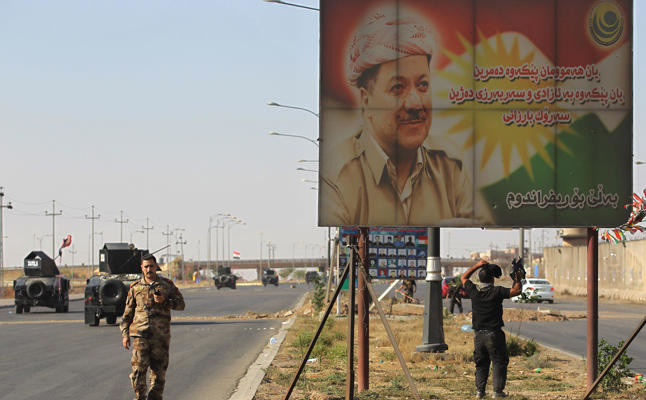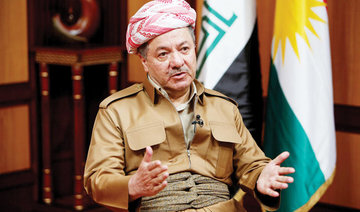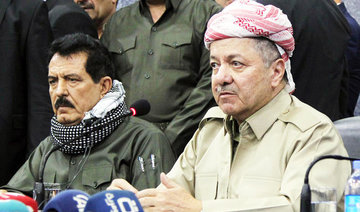BAGHDAD: President Masoud Barzani, who said Sunday he was stepping down, founded Iraq’s autonomous Kurdish region but was also responsible for sparking its gravest crisis with his drive for independence.
The son of iconic Kurdish nationalist leader Mullah Mustafa Barzani and the head of the Kurdistan Democratic Party (KDP) since 1979, the 71-year-old joined the fight for an independent Kurdistan as a teenager.
Born on August 16, 1946 in Mahabad, capital of a Kurdish republic declared by his father amid unrest in Iran following World War II, Barzani’s dream of independence was also shattered by his own actions.
His mistake was organizing a referendum on independence, held on September 25 despite warnings from Baghdad which branded the move unconstitutional and advice from world powers keen on Iraqi unity.
Weeks after the vote, central government forces launched a sweeping operation, reclaiming territory and oilfields in and around the disputed province of Kirkuk from Kurdish peshmerga forces.
The loss of the oilfields, which provided income that would have been critical to an independent Kurdish state, sparked internal recriminations.
His detractors called for him to quit and the Kurdish parliament stripped him of his powers and met Sunday to redistribute these among the legislative, executive and judicial authorities.
'Pragmatic and stubborn'
Round-faced and sporting a small moustache, the “lord of the mountain” as he is often known, is usually seen wearing the garb of a peshmerga fighter: baggy khaki pants and shirt, a traditional sash and a chequered red and white scarf rolled around his head as a turban.
He is considered to be both pragmatic and stubborn.
His demand for self-rule within all historically Kurdish-populated areas of Iraq put him on a collision course with the Arab-led government in Baghdad and frustrated international powers.
One Western diplomat who asked Barzani to postpone the independence vote was flatly told: “No, I can’t do it. I have a window of opportunity which will not happen again.
“Baghdad is still weak but is getting stronger, and then it will be too late,” Barzani told the diplomat.
“I cannot go back and I believe that the countries which are advising me against holding the referendum will back me later.”
That was his mistake.
Barzani “misinterpreted” the messages of his allies, particularly the United States and Ankara, according to Kurdish affairs analyst Mutlu Civiroglu.
Failing to read between the lines led not only to the isolation of the Kurds but also to the isolation of Barzani’s KDP, a formidable body founded in 1946.
Barzani had headed the KDP since 1978, taking over the leadership from his father.
For decades he was at odds with the rival Patriotic Union of Kurdistan (PUK), the party of Iraq’s late president Jalal Talabani.
Siding with Iran
During the 1980-1988 Iraq-Iran war, both parties sided with Tehran.
That partnership came at a heavy price and brought down retribution from Iraqi dictator Saddam Hussein.
In 1987, Saddam launched the Anfal campaign which saw nearly 180,000 Kurds killed and more than 3,000 villages destroyed.
The Saddam regime’s policy of “Arabization” forced thousands of Kurds to leave their homes, to be replaced by Arabs.
Baghdad also used chemical weapons against the village of Halabja, killing 5,000 people.
After the 1991 Gulf War over Kuwait, the Kurds won de facto autonomy when Western powers intervened to protect them from Saddam.
The United States and its allies set up no-fly zones in southern Iraq and the northern, Kurdish-majority region.
In 1992 the Iraqi Kurds elected a parliament and set up a government. The KDP controlled the north of the region up to the Turkish border while the PUK controlled the southeast, up to the Iranian border.
Their political honeymoon was short-lived, and in 1994 the PUK and the KDP fought a near civil war over the distribution of the territory’s resources and taxes imposed by the KDP on border traffic with Turkey.
Barzani turned to his nemesis Saddam for help to push back Talabani’s forces.
The episode prompted Iraqi Prime Minister Haider Al-Abadi to chide Barzani recently, saying that pact was a “blot” that had tarnished his reputation.
Barzani and Talabani buried the hatchet in 2003 as the Kurds allied with American troops in the war to overthrow Saddam.
After his ouster, the Kurds unified their administration, with Irbil in northern Iraq as the capital of Iraqi Kurdistan.
In 2005, Barzani was appointed president by the Kurdish parliament and in 2009 elected with 69.6 percent of the votes in Kurdistan’s first presidential election.
His mandate expired in 2013 but was extended for two years and then continued in the chaos that followed the Daesh group’s sweeping offensive across Iraq in 2014.
























